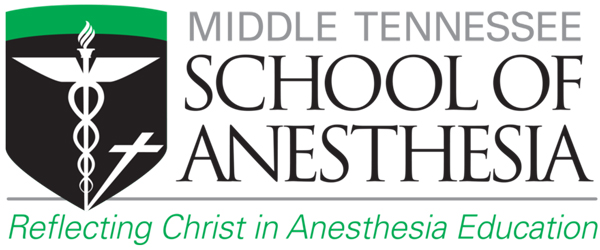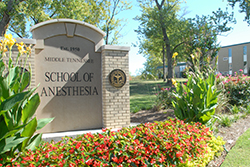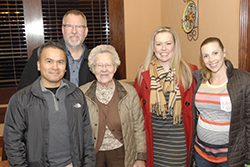Practice Doctorate/DNAP Program
The Doctor of Nurse Anesthesia Practice (DNAP) degree is the highest practice degree in nurse anesthesia. MTSA offers the DNAP Practice Doctorate to registered nurses who have met each of the application requirements for admission. The DNAP Practice Doctorate is a full-time course of study for 36 consecutive months, on the campus of MTSA. In the third semester of the DNAP program, students will begin a rigorous clinical rotation process that offers students a vast array of clinical experiences in the peri-anesthesia setting. These clinical rotations will allow students to learn and sharpen their anesthetic skills throughout the remainder of the program.
The Practice Doctorate curriculum is designed to apply a scholarly process for the inquiry, searching, appraisal, and translation of current evidence. A doctoral project is the culmination of work during the evidence-based practice course series and serves to contribute to the anesthesia body of knowledge in education, practice or the profession. Dissemination opportunities of completed doctoral projects are offered during the MTSA Anesthesia Symposium and the Tennessee Association of Nurse Anesthetists.
Admissions Timeline
| Application Opens | September 15, 2025 |
| Application Deadline | January 12, 2026 |
| Interview Date Ranges | March-April 2026 (Dates TBD) |
APPLY NOW»
Please note: NursingCAS can take 4-6 weeks to verify transcripts, and delays may occur during peak periods or due to unforeseen transcript issues.
Register now to attend or request a recording of the upcoming free webinar, “Preparing and Strengthening Your NursingCAS Application,” on September 30, 2025, from 1:00 PM – 2:00 PM CDT. All things related to your application—transcripts, evaluations, and ensuring a quick processing time—will be covered!
Admission Requirements
- Cumulative GPA and cumulative Science GPA of 3.0 or higher
- All academic transcripts obtained after high school (This includes MTSA if you have taken the Advanced Physiologic Foundations course. Here are instructions on requesting a transcript from MTSA.) Please request your electronic transcripts to be sent directly to NursingCAS, not to MTSA. Hard copy transcripts cannot be accepted due to GPA calculation processes that take place in NursingCAS.
- Certified Critical Registered Nurse (CCRN) Certification Score Report (Please include your CCRN score report that you received at the conclusion of the test.)
- Current Nursing License (Please include all states if you are licensed in more than one state.)
- 1 year of critical care experience (ICU or CCU) as a Registered Nurse is required. Experience with adult patients is preferred. This requirement must be fulfilled prior to the closing of the application cycle on January 12, 2026.
- GRE: An official GRE Score Report must be submitted by ALL applicants directly to NursingCAS from ETS using code 1410 prior to application submission. All applicants are required to upload the ETS Confirmation page once GRE scores have been requested to be sent to NursingCAS. MTSA does not offer waivers for the GRE for any applicants including those with a Master’s Degree. However, past GRE results utilized for graduate school admission may be submitted. (If you would like to upload your GRE Test Score Report to your application documents, you may do so under “Other”. Please note that submission of the test score report pdf alone will not meet your GRE requirement.)
- References: MTSA requires two references and allows up to five to be submitted. The first must be a nursing supervisor (current ICU shift leader, team leader, nurse manager, or other nursing supervisor). The second must be from an individual who can attest to the applicant’s personal and professional attributes. This individual cannot be related or in a personal romantic relationship with the applicant.
- ACLS and BLS certifications through the American Heart Association are required at the time of application.
- Personal Statement: One to two pages including describing your experience, why you would like to be a CRNA, and how your goal to be a CRNA reflects MTSA’s mission statement. If you are a reapplicant, please also explain what you have done differently since your last application.
- CV/Resume: Please do not exceed two pages, if possible.
- Chemistry: If a chemistry course was not included in your undergraduate program, MTSA requires a three-semester hour Chemistry course prior to enrollment.
- Personal Interview (by invitation only): Candidates may be eligible for an early admissions offer, if the following criteria has been met: competitive cumulative Science GPA and a quantitative GRE score of over 150 (or combined 300 for quantitative and verbal). Candidates will be required to complete the DNAP-PD Survey (provided before interviews.)
- TOEFL: Only required if both conditions are met: 1) A language other than English is selected as your first language in your application. 2) You have not graduated from a university or college located in the United States.
- Past CRNA Program Director Letter: Only required if you have been previously enrolled in another CRNA program.
- Other Degree-Seeking Programs: If you are currently enrolled in a degree-seeking program that you do not plan to complete, please submit a letter of acknowledgement from the program administrator sent to MTSA.
- Headshot photograph: Submission required if invited to interview.
- Pre-Interview Applicant Survey: Submission required if invited to interview.
- Please note that a background check will be required upon acceptance into the program.
- MTSA does not require applicants to complete the Family section or the High School Information section of this application. However, the Experience (employment) section of the application is required. Start with your most current ICU position. *Please note the ICU Experience admission requirement states: Minimum of 1 year critical care experience (ICU or CCU) in the U.S. as a RN, adult ICU preferred. (The minimum 1 year of experience must be completed prior to the January 12 application deadline.)
- In-person attendance at mandatory orientation that occurs in the fall before January matriculation.
DNAP-PD Admission Requirements for Re-Applicants
A minimum of a three-credit hour graduate level science course is recommended to be taken after your previous application cycle and before reapplying. Advanced Pathophysiology or Advanced Pharmacology are highly recommended courses. MTSA offers Advanced Physiologic Foundations for Nursing Practice online. Please visit the MTSA Academics webpage for more information.
Please contact admissions@mtsa.edu with questions regarding the DNAP-Practice Doctorate Program or its admission requirements.
All Admission Requirements are due by the application deadline (January 12, 2026).
More Information
The MTSA Student Handbook includes more information about the application and admissions process. Below are several helpful links:
Admissions Requirements»
Admissions Checklist»
Interview Process»
Re-Applicant Information»
Comparison of professional practice doctoral degrees and research doctoral degrees
It is important for nurse anesthetists who want to pursue doctoral education to choose the doctoral degree that best fits with their educational and professional goals before applying to a doctoral program. The following information provides some basic information about the two types of doctoral degrees available to nurse anesthetics, which will assist them in choosing the degree and program that fits their goals.
A professional practice degree, such as the DNAP, focuses on application of research findings to practice-related problems, which is similar to other professional practice degrees, such as the Doctor of Dentistry, Doctor of Pharmacy, and Doctor of Physical Therapy, among others.
A research-oriented degree, such as the Doctor of Philosophy (PhD), focuses on primary data-based investigation for the discovery of new knowledge.
The Council on Accreditation of Nurse Anesthesia Educational Programs (COA) accredits nurse anesthesia programs that offer master’s degrees, practice doctorate degrees, and research-oriented doctoral degrees which are focused in nurse anesthesia. COA has set specific standards for programs offering practice-oriented doctoral degrees and research-oriented degrees. The following table compares COA’s standards for these two types of doctoral degrees. As the table indicates, the two types of doctoral degrees parallel each other in quality and rigor, but the focus and outcomes of the two degrees differ. Doctoral programs in nurse anesthesia are designed using these criteria as a basis.
| RESEARCH-ORIENTED DOCTORATE (E.G., Doctor of Philosophy) |
PRACTICE-ORIENTED DOCTORATE (E.G., Doctor of Nurse Anesthesia Practice) |
| FOCUS:
Primary data-based investigation for the discovery of new knowledge. |
FOCUS:
Application of research findings to practice-related problems. |
| TO ACCOMPLISH THE FOCUS:
Doctoral students master additional theory and knowledge in an area of academic focus for the discipline in which the degree is awarded. |
TO ACCOMPLISH THE FOCUS:
Doctoral students are prepared to advance theory and knowledge of the discipline in which the degree is awarded. Doctoral students achieve advanced scholarship skills relevant to the area of academic focus. |
| Doctoral students develop advanced scholarship skills and generate research relevant to the discipline. Doctoral students complete a scholarly work that demonstrates knowledge within the area of academic focus. | Doctoral students complete a dissertation or equivalent scholarly work which constitutes an original contribution to the knowledge within the discipline. |
| Faculty members demonstrate competency in scholarly and professional work in the relevant discipline. | Faculty members demonstrate competency for scholarly and professional work in the relevant discipline. |
| Doctoral students have sufficient access to appropriately credentialed faculty. | Doctoral students have sufficient access to appropriately credentialed faculty. |
Questions? Click here to email us.









